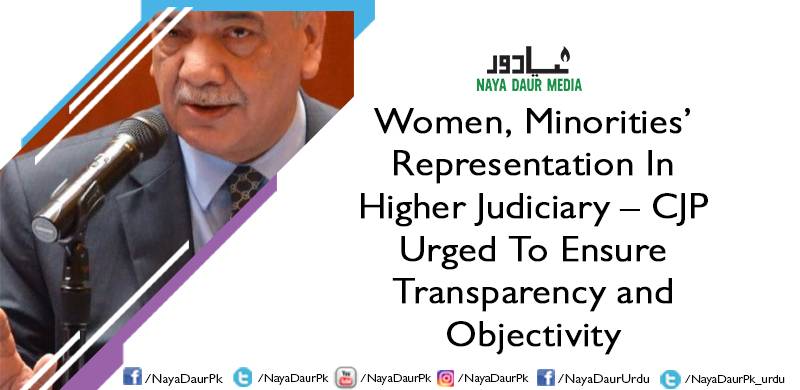
In an open letter to Chief Justice Asif Saeed Khosa, women lawyers and activists have called for initiate developing clear guidelines for formulation of an objective criterion as the basis for judicial nominations so that a more open and transparent process of appointments could be introduced.
In a letter titled ‘Transparency and Objectivity in Judicial Nominations Process’, Women in Law Initiative Pakistan, Women Lawyers’ Association Karachi and Women’s Action Forum expressed their concerns over a list comprising 13 names recommended for appointment as ad hoc judges in Lahore High Court (LHC), terming it non-inclusive and non-diverse because it does not contain any woman.
They said there were only five women judges out of a total of 106 in various high courts. And there was no sitting judge from the minorities in the higher judiciary, they added.
Ensuring that the judicial nominations process is transparent, objective and clear in order to sustain public confidence in the judiciary and the legal profession upholds its basic tenets of equality and justice is important, the letter read.
It said the Article 193 (2) and the Judicial Commission of Pakistan Rules 2010 remain silent on providing any objective and clear benchmark or criteria in terms of principles, characteristics, and competence on the basis of which such a nomination is made.
“The process of determining these nominations, therefore, appears arbitrary and likely to go against the very principle of equal representation that Pakistani institutions are bound to uphold under Article 25 of the Constitution of Pakistan
1973” the letter said, adding that “which not only calls for equality of all citizens before the law but also empowers the state to make any special provision for protection of women and children.”
The letter said, “In absence of any clear guidelines or criteria for judicial nominations, the exercise remains largely inscrutable and it becomes difficult to ascertain what ‘merit’ means and what qualities, skills, characteristics and expertise may be required for a lawyer to be considered for judicial nomination.”
It said the range of nominations in the past had been quite narrow and not in line with principles of inclusion, diversity and equality of opportunity, “therefore, there is a need to revisit the judicial nominations process in line with agreed best practices and global trends as well as in line with Pakistan’s commitments under affirmative action for parity, Sustainable Development Goals and fundamental rights by making it more inclusive, clear and transparent.”
In a letter titled ‘Transparency and Objectivity in Judicial Nominations Process’, Women in Law Initiative Pakistan, Women Lawyers’ Association Karachi and Women’s Action Forum expressed their concerns over a list comprising 13 names recommended for appointment as ad hoc judges in Lahore High Court (LHC), terming it non-inclusive and non-diverse because it does not contain any woman.
They said there were only five women judges out of a total of 106 in various high courts. And there was no sitting judge from the minorities in the higher judiciary, they added.
Women Lawyers And Activists' Open Letter To Chief Justice Asif Saeed Khosa
Ensuring that the judicial nominations process is transparent, objective and clear in order to sustain public confidence in the judiciary and the legal profession upholds its basic tenets of equality and justice is important, the letter read.
It said the Article 193 (2) and the Judicial Commission of Pakistan Rules 2010 remain silent on providing any objective and clear benchmark or criteria in terms of principles, characteristics, and competence on the basis of which such a nomination is made.
“The process of determining these nominations, therefore, appears arbitrary and likely to go against the very principle of equal representation that Pakistani institutions are bound to uphold under Article 25 of the Constitution of Pakistan
1973” the letter said, adding that “which not only calls for equality of all citizens before the law but also empowers the state to make any special provision for protection of women and children.”
The letter said, “In absence of any clear guidelines or criteria for judicial nominations, the exercise remains largely inscrutable and it becomes difficult to ascertain what ‘merit’ means and what qualities, skills, characteristics and expertise may be required for a lawyer to be considered for judicial nomination.”
It said the range of nominations in the past had been quite narrow and not in line with principles of inclusion, diversity and equality of opportunity, “therefore, there is a need to revisit the judicial nominations process in line with agreed best practices and global trends as well as in line with Pakistan’s commitments under affirmative action for parity, Sustainable Development Goals and fundamental rights by making it more inclusive, clear and transparent.”
